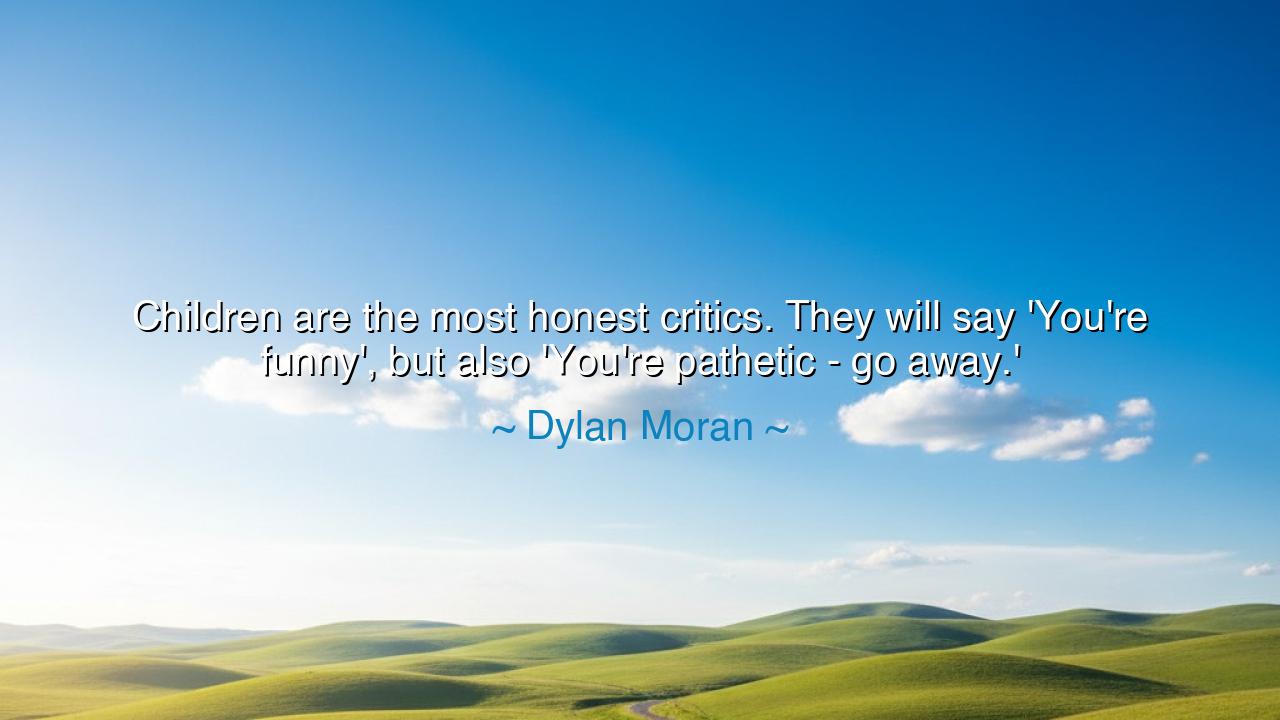
Children are the most honest critics. They will say 'You're
Children are the most honest critics. They will say 'You're funny', but also 'You're pathetic - go away.'






The words of Dylan Moran—“Children are the most honest critics. They will say ‘You’re funny’, but also ‘You’re pathetic – go away.’”—speak to one of the deepest truths about human honesty, perception, and humility. Beneath their wry humour lies a wisdom as old as time: that the purest judgment comes not from scholars or crowds, but from those whose hearts remain uncorrupted by flattery or fear. Children, untrained in the artifice of manners, look upon the world and name it as they see it. Their praise is a crown of truth; their rejection, a mirror without distortion. Moran’s reflection, though spoken with jest, reveals the sacred power of innocence—the ability to discern authenticity from pretense, sincerity from performance.
To call children “the most honest critics” is to acknowledge that their souls have not yet learned deceit. They do not applaud to please, nor do they soften their words to comfort the ego. When they laugh, it is because something has genuinely struck the string of joy within them; when they turn away, it is because they sense falsehood, fatigue, or vanity. This unfiltered honesty terrifies the adult world, which thrives on layers of performance. Yet in truth, this honesty is the purest form of feedback one can receive. For to be found funny by a child is not simply to amuse—it is to awaken something innocent and true, something that recognizes the light of authenticity within you.
In the ancient world, philosophers revered the simplicity of youth as the gateway to truth. Socrates, when asked who among men was the wisest, once replied that only the child understands the limits of his own knowledge. Children, he knew, are not yet burdened by self-importance; they look and see clearly. So too with Moran’s observation: the child’s criticism, even when harsh, springs not from cruelty but from clarity. The child has no stake in your feelings—they see what is, not what should be. Thus their laughter is pure judgment, unclouded by praise or pity.
To be told by a child, “You’re pathetic—go away,” is therefore not an insult, but an initiation. It is a call to humility, a reminder that art and authenticity cannot be faked. The performer who lives on borrowed charm, the speaker who seeks only approval, will always be exposed before the eyes of innocence. But the one who dares to be real, who speaks not from ego but from spirit, will find in the laughter of children something divine—a confirmation that truth still has power. As the ancient dramatists knew, the audience that cannot be fooled is the audience that sanctifies art.
There is a story told of the playwright Aeschylus, whose tragedies moved the hearts of men and women alike. Yet once, after a performance, a group of young boys mocked his solemn tone, imitating his gestures and pompous delivery. Instead of anger, Aeschylus laughed, saying, “The gods have spoken through small mouths.” From that day, he sought greater simplicity, cutting away the grand speeches and returning to the raw pulse of human emotion. The laughter of children, like that of the heavens, purified his art. So too must every artist, every human being, listen when innocence speaks—for truth often wears the face of a child.
Moran’s insight extends beyond comedy; it touches all of life. In our work, our relationships, our dreams, we must seek this same childlike honesty—to see clearly, to speak plainly, and to live without pretense. The world trains us to seek applause, to crave approval, to measure worth by the reaction of the crowd. Yet the laughter of children reminds us that real value lies in sincerity. You cannot deceive those who have not yet learned to lie; and in their unflinching truth, we find our measure.
So, let this be the teaching: welcome the child’s judgment, whether it flatters or humbles you. Seek out those who, like children, tell you what is real, not what is comfortable. Let their clarity cut through your illusions. If they call you funny, rejoice—not for the compliment, but for the connection. If they call you pathetic, give thanks—for they have shown you the gap between your truth and your performance. The wise do not resent the voice of innocence; they learn from it.
For in the end, Dylan Moran’s words remind us that the greatest critic is not the cynic, nor the scholar, but the soul that still sees with wonder. To earn the laughter of a child is to earn a fragment of eternity. To be rejected by one is to be called back to authenticity. And so, let us live and create not for applause, but for honesty—for it is only in the clear eyes of innocence that we truly see who we are.






AAdministratorAdministrator
Welcome, honored guests. Please leave a comment, we will respond soon